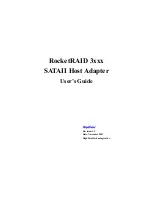
- 17 -
encrypted tunnel. TTLS supports any protocol within its tunnel, including
CHAP, MS-CHAP, MS-CHAPv2, PAP and EAP-MD5. PEAP specifies that
an EAP-compliant authentication protocol must be used; this card
supports EAP-MSCHAP v2, EAP-TLS/Smart card and Generic Token
Card. The client certificate is optional required for the authentication.
TLS/Smart Card
–TLS is the most secure of the EAP protocols but not
easy to use. It requires that digital certificates be exchanged in the
authentication phase. The server presents a certificate to the client. After
validating the server’s certificate, the client presents a client certificate to
the server for validation.
MD5-Challenge –
MD5-Challenge is the easiest EAP Type. It requires
the wireless station to enter a set of user name and password as the
identity to RADIUS Server.
Session Resumption
There are “Disabled”, “Reauthentication”, “Roaming”, “SameSsid” and
“Always” selections for you to choose whether to recovery the session in
different status.
Identity
Enter the name as the identity for the server.
Password
Enter the password as the identity for the server.
Use Client Certificate
A client certificate is required for TLS, and is optional for TTLS and PEAP.
This forces a client certificate to be selected from the appropriate
Windows Certificate Store and made available to the RADIUS server for
certification.
Tunneled Authentication
Protocol
When the authentication type is PEAP or TTLS, select a protocol to be
used to build the encrypted tunnel.
Identity
This is the protected user EAP Identity used for authentication. The
identity specified may contain up to 63 ASCII characters, is case sensitive
and takes the form of a Network Access Identifier, consisting of <name of
the user>@<user’s home realm>. The user’s home realm is optional and
indicates the routing domain.
Password
The password used for authentication. It may contain up to 63 ASCII
characters and is case sensitive.
















































